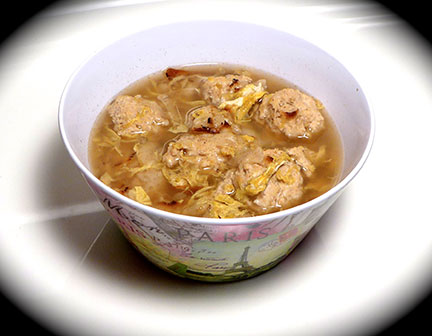When I first read about this traditional Italian Passover soup it was really the name that captured my attention. (What a great name!) It conveyed that it was both a filling Italian soup, as well as one sufficient for Passover. So as usual, I began looking into the meaning of the words themselves. Minestra (a general term for hearty vegetable soups cooked with dried pasta) is rooted in the Italian/Latin word minestrare, meaning “to administer,” or “to serve.” It was originally a one-pot dish (most likely first prepared by the poor) that cooked leftover vegetables, potatoes, beans, and pasta or rice in a broth and was served at the table as the main or only course for the meal (the popular minestrone known in the USA is a type of minestra). The word dayenu in Hebrew literally means, “enough for us,” a phrase we are all familiar with either chanting or singing at the end of our Seder meal as a way of showing our endless gratitude to God for having saved us from eternal slavery (“If he had brought us out of Egypt, and had not carried out judgements against them — Dayenu, that would have been enough… If he had fed us the manna and had not given us Shabbat — Dayenu, that would have been enough.”)
In Claudia Roden’s, “The Book of Jewish Food,” (Knopf, 2007) Ms. Roden describes her recipe as having been personally mailed to her from a woman in Turin, Italy. In doing a search online I came across a few others that mentioned this specific soup as well. It seems that this particular minestra captures the spirit of the traditional Roman or Italian soup in that it utilizes a broth (chicken) as the base to cook down leftover pieces of matzah to create a thick pasta-like soup. The addition of cinnamon as well as beaten egg yolks reflects the Sephardic/Eastern touch, however, and turns it into a perfect Passover-friendly dish. While preparing this soup I quickly texted an Italian friend of mine in New York to ask her the following: “Is Minestra Dayenu something that you and your family prepared for Passover in Italy, and if so, is it simply chicken broth, egg yolks, cinnamon, and matzah pieces?” She instantly replied, “Yes, we did do this but you cannot make it using the Israeli or American style matzah because they are too thin and completely fall apart — it’s like using lentils instead of rice to make risotto! Every Passover my mother sends me the French kind to use because they hold together more like pasta. You have to use the French kind or it’s not worth it.”
In the end I prepared my own version of Minestra Dayenu utilizing defrosted homemade turkey broth (yes, from the holiday that keeps giving!). Once the broth had started to boil, I added salt, black pepper, and just enough ground cinnamon to taste it. I threw in a few broken up squares of good ‘Ol American-Israeli matzah (will have to wait until my next trip to France for the better kind) and let the soup slow boil for 15 minutes. Then I beat up a few egg yolks and quickly mixed them (for all you New York City Jews out there, yes, it looked like Chinese egg drop soup, but not as thick, and reminded me of the Bukharian egg soup recipe that I had learned this past October). And there it was, simple, and filling all at the same time. That should have been enough.
But something was missing, and I found myself wanting to add a bit more substance to make it a complete meal. Inspired by another Italian Passover soup recipe called, Minestra di Riso, I ended up making small one-inch meatballs with ground chicken (okay, turkey, but it should be chicken), eggs, matzah cake flour, salt, pepper, cinnamon, and parsley and cooking them into the soup for 25 minutes. These chicken dumplings looked nice in the soup and reminded me of tiny matzah balls. If you decide to prepare this dish as a main course, then perhaps adding the meatballs would be more satisfying. But I should mention that the more traditional Minestra Dayenu soup does not have these chicken dumplings, and that as a starter to the greater Passover dinner it would be more than enough without them. Dayenu.
QUESTIONS:
For those of you out there who are familiar with this particular Passover soup, can you tell me how you prepare it?
Is the egg that is mixed in like egg drop soup, or much smoother? How strong is the cinnamon flavor?
Do you add chicken dumplings?

